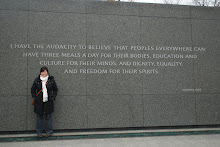A piece I just wrote for a submission to Speaking of Faith radio (an awesome show:
http://speakingoffaith.publicradio.org/index.shtml) on "Something that makes you contemplate the deeper meanings of possession of land and its care." ...
I work as a garden coordinator for a 1 acre community garden called "Community Roots Garden/ El Jardin de Raices Comunitarias." This non-profit garden, founded to increase food self-reliance, is a ministry of the North Oxnard United Methodist Church in Oxnard, CA. Oxnard is home to a large population of indigenous people from Oaxaca, Mexico called the Mixtec. Many of the Mixtec work as farm workers in the area, and are often marginalized because, in addition to their immigration status, they speak different indigenous dialects and Spanish is a second language.
Over the last year, our garden has been developing a partnership with a Mixtec organization in the area. Last weekend we invited them to come plant with us and to share their knowledge about medicinal herbs. About 15 people came, bringing different Oaxacan seeds and transplants with which to start a medicinal herb garden.
The location where we chose to plant was, to me, a profound choice. We dug into the rich, soft soil at the foot of the cross, planting indigenous healing herbs under the Christian symbol of reconciliation.
Yet even more meaningful than planting seeds for healing under the cross was the small act of reconciliation that followed - a shared potluck. Our predominately white, upper-middle class regular volunteers exchanged both plates and broken Spanish back and forth over the table with the Mixtec gardeners. I felt a hunger then in all present that went beyond food, a hunger for relationship and connection with those who are different and kept separate by society's borders and walls.
Fred Bahnson, writer, farmer, and previous director of Anathoth Garden in NC, wrote in a recent essay, "Jeremiah made clear that planting gardens and seeking peace were symbiotic practices—like sowing beans with your corn, and marigolds with your tomatoes—and exactly the kind of companion-planting the church should be doing." (http://flourishonline.org/2010/08/famine-to-feast-the-story-of-anathoth-community-garden/)
I believe that the Christian church can enter into a place of witness, hospitality, and justice for the "stranger" in the land when it practices this "companion planting," as Bahnson so eloquently describes it. Churches, like the one where I work, can move to dis-posses their land in favor of the dis-possessed.
Many Latino migrants to California came due to our government's economic policies in Mexico, which pushed small farmers off their land and pulled them into the work of feeding the U.S. population through farm work. What better role for the church to fill than to offer an opportunity for re-possession of land and labor through providing a space for dispossessed indigenous farmers to garden? What better way to welcome the hungry of all social classes and races, to share the earth and to become neighbors? And what better place to plant healing herbs together, to break bread and tortillas, and, in the process, the walls that divide.
Subscribe to:
Post Comments (Atom)




2 comments:
Hey, Kat, I am glad you are staying around to help, and that you get your own batch of kiddies - they are the best...
Get in touch - I have some questions for you...
Mike
This is great--I hope they accept the story! I love this idea...kind of like reparations in a really beautiful and loving way. My old church in philly has an ENORMOUS lawn...this could be such a good idea for them. i will pass it on!
take care--Margaret
Post a Comment